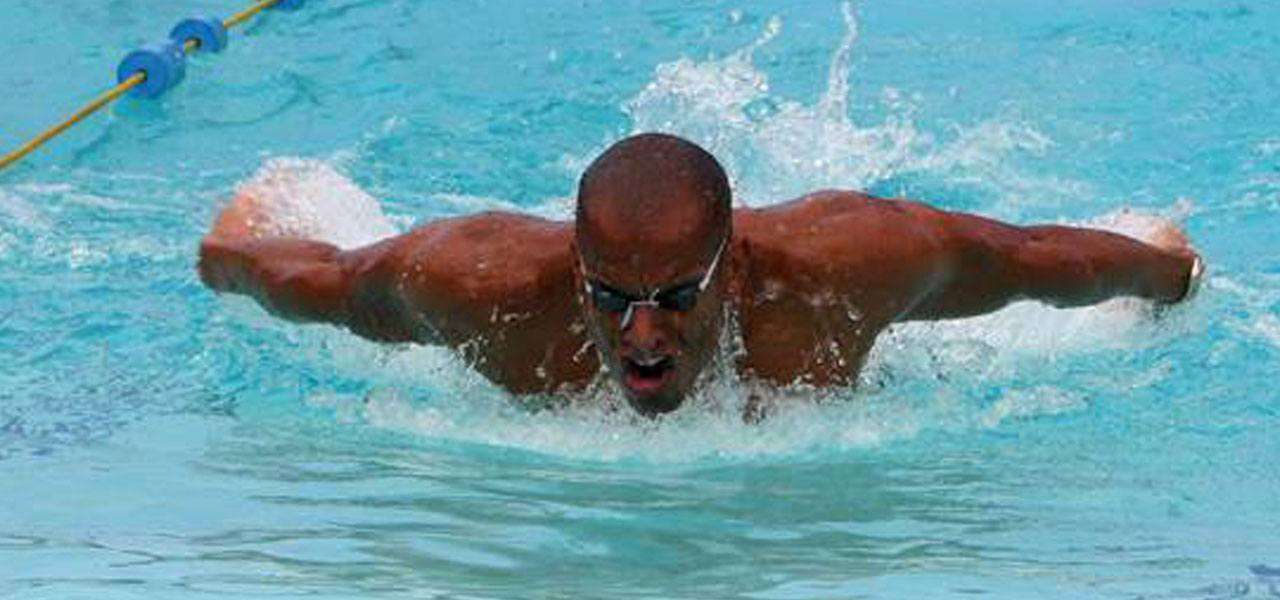
Champion Swimmer Sabir Muhammad on How He is Helping More Black Kids Swim
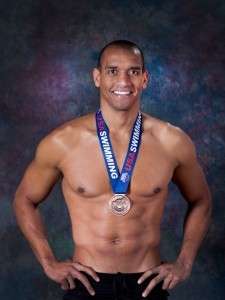 Sabir Muhammad is a ten-time American record breaker, five-time U.S. Open Champion and 25-time All American and NCAA Champion at Stanford University. He is the author of Born to Swim, an autobiographical account of his fear-turned-fascination with water that led him to become a notable swimmer. Born to Swim is illustrated by Toni Scott Daniel. Muhammad also founded and operates the Atlanta Swim School in his home town of Atlanta Georgia. Now, Muhammad is focused on giving back to the community. He was happy to share his knowledge gained from years of swimming and coaching at the elite level with Black Kids Swim readers.
Sabir Muhammad is a ten-time American record breaker, five-time U.S. Open Champion and 25-time All American and NCAA Champion at Stanford University. He is the author of Born to Swim, an autobiographical account of his fear-turned-fascination with water that led him to become a notable swimmer. Born to Swim is illustrated by Toni Scott Daniel. Muhammad also founded and operates the Atlanta Swim School in his home town of Atlanta Georgia. Now, Muhammad is focused on giving back to the community. He was happy to share his knowledge gained from years of swimming and coaching at the elite level with Black Kids Swim readers.
Black Kids Swim: How were you introduced to the sport of swimming?
Sabir Muhammad: Through my mom. As a kid I had a near drowning experience at a family reunion. My relatives told my mom that she needed to put me in swimming lessons. So eventually my mother put me into swimming lessons with a bunch of my friends and that’s how I got introduced to the sport.
BKS: Why did you start the Atlanta Swim School? How has it changed Black participation in the sport of swimming?
[pullquote align=”right” class=”” link=”” color=”#066cb2″ size=”20″]When I started the Atlanta Swim School my priority wasn’t to build a small business that would be extremely profitable My priority was to teach kids of all kinds to learn how to swim. [/pullquote]
SM: I was inspired to start the Atlanta Swim School as a result of parents reaching out to me. Parents in Atlanta were having trouble identifying someone to teach their kids to swim. It started with 4 or 5 families. I put together clinics and taught the kids to swim. Then I said we should probably open this up to other parents in the neighborhood. We started getting more swimmers and every summer the program grew a little bit. Now, the Atlanta Swim School is a full fledged year round program where we are teaching kids to swim. We teach water survival skills as well as train competitive swimmers. We take kids as young as 6 months old all the way up to kids competing with USA Swimming.
BKS: Do you still swim competitively?
SM: I haven’t competed in about 3 years. My last competitive event was the USA National Championships in Atlanta hosted by USA Swimming. I wanted to compete in an event in front of the kids that swim in my school so I invited them out to watch me race. That was the last time I competed. I competed against swimmers like Nathan Adrian who went on to win three Olympic gold medals.
BKS: How’d you do?
SM: I ended up qualifying for the Olympic trials in that meet. But what was most important to me is that the kids saw that. That experience, for them, really brought home the importance of the work that we do in the pool. Once you get to a venue like the USA Swimming National Championships there’s a bit of pomp and circumstance about it – but I wanted them to see that the work they put in in the pool and the things that I tell them and instruct them to do – it translates into real opportunities. So I wanted to swim in front of them and have them exposed to the meet just so they could put two and two together.
BKS: What can parents of Black swimmers do to increase the numbers of Black swimmers in the sport?
SM: One of the things I really try to focus on is helping to facilitate the learning process for other African American or minority kids. I helped establish a scholarship program for my swim school. For every four paying students, the Atlanta Swim School gives one child a scholarship. I really believe in that because it allows kids who would not normally have exposure to the sport of swimming the continuity of a program that will allow them to learn. If we as parents of Black swimmers will continue to foster programs like that we can increase the ranks.
BKS: Absolutely! Club swimming is expensive (as much as $160 a month and sometimes more) and that’s cost prohibitive. We’ve been told by swim coaches that many swim clubs are small businesses and can’t always afford to give scholarships. How does the Atlanta Swim School do it?
SM: We just set that as a part of our core values. We made it a priority. When I started the Atlanta Swim School my priority wasn’t to build a small business that would be extremely profitable My priority was to teach kids of all kinds to learn how to swim.
BKS: Many swim parents dream of college scholarships or Olympic games for their children. What are some of the other opportunities swim skills can offer our kids?
SM: You hit on two of the big ones. The biggest opportunity is that college scholarship for athletes who can compete at that level. Beyond a free education, swimming is an incredible sport because it teaches kids the importance of hard work. You will never meet a swimmer who has been successful in the sport who hasn’t worked very hard to achieve everything they have. Swimming teaches kids the right skills; it teaches kids that hard work is important for success. Sometimes you can get lucky or you can have skills that translate to another sport. Like, if you’re a naturally fast runner you may do well as a football player but in the sport of swimming everybody has to learn it – everybody starts from zero. So, it requires a lot of hard work from every participant in order to succeed.
BKS: Tell us about your service in South Africa. What impact did your work have?
SM: In 2009 I traveled to South Africa as a part of the Swimming World Cup competition. I went over there to compete, but at that point in my career I really just wanted to give back. So, I worked with the organizing committee of the Swimming World Cup to see if I could perform a clinic for kids that were disenfranchised and needed support and encouragement. 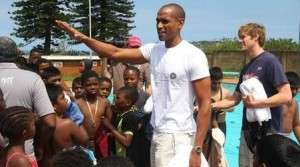 I worked with them and they identified a couple of townships in South Africa where they had pools and they took me. And I recruited another friend of mine, who was a world record holder at the time, to go with me and talk to these kids about swimming. I talked to them about the importance of having big dreams and projecting themselves outside of their current situations. My goal was to inspire them to take on more in their lives – that really was the purpose of the outreach there. The people we spoke to had never had an opportunity to see and talk with an elite swimmer. They were all just learning how to swim. So, seeing what we could do in the water – they probably had never seen anybody perform all of the strokes. I think that was interesting to them. And also the interaction with someone who came from across the world, who looked very much like them but spoke differently. Interacting with someone from the other side of the world who had a lot of love in their heart and encouragement for them. That type of interaction was something that they’d never had. We asked them ‘How many people have heard of Michael Jordan and Tiger Woods’ and they had never heard of them – they just didn’t have much exposure to the world outside of their township. I think we kind of opened a door for them just by being there.
I worked with them and they identified a couple of townships in South Africa where they had pools and they took me. And I recruited another friend of mine, who was a world record holder at the time, to go with me and talk to these kids about swimming. I talked to them about the importance of having big dreams and projecting themselves outside of their current situations. My goal was to inspire them to take on more in their lives – that really was the purpose of the outreach there. The people we spoke to had never had an opportunity to see and talk with an elite swimmer. They were all just learning how to swim. So, seeing what we could do in the water – they probably had never seen anybody perform all of the strokes. I think that was interesting to them. And also the interaction with someone who came from across the world, who looked very much like them but spoke differently. Interacting with someone from the other side of the world who had a lot of love in their heart and encouragement for them. That type of interaction was something that they’d never had. We asked them ‘How many people have heard of Michael Jordan and Tiger Woods’ and they had never heard of them – they just didn’t have much exposure to the world outside of their township. I think we kind of opened a door for them just by being there.
At the close of the interview Muhammad told Black Kids Swim that he wished us much success. Sharing the world of swimming with the Black community has been his life’s work and that’s something we have in common!
Sabir Muhammad and his family are expecting a baby in January of 2016 and we wish them health and happiness. Also, Sabir’s son Kamal Muhammad is a swimmer following in his father’s footsteps. You may see Kamal at the Black Heritage Swim Meet in Cary North Carolina in May 2016.
You can find Sabir Muhammad at the Atlanta Swim School. Follow him on Twitter @sabirswim and Facebook Sabir Muhammad (swimmer)
Ebony is a wife and mommy of two gorgeous swimmers. She started Black Kids Swim to help parents (like herself!) who want to be supportive swim parents to African American children.




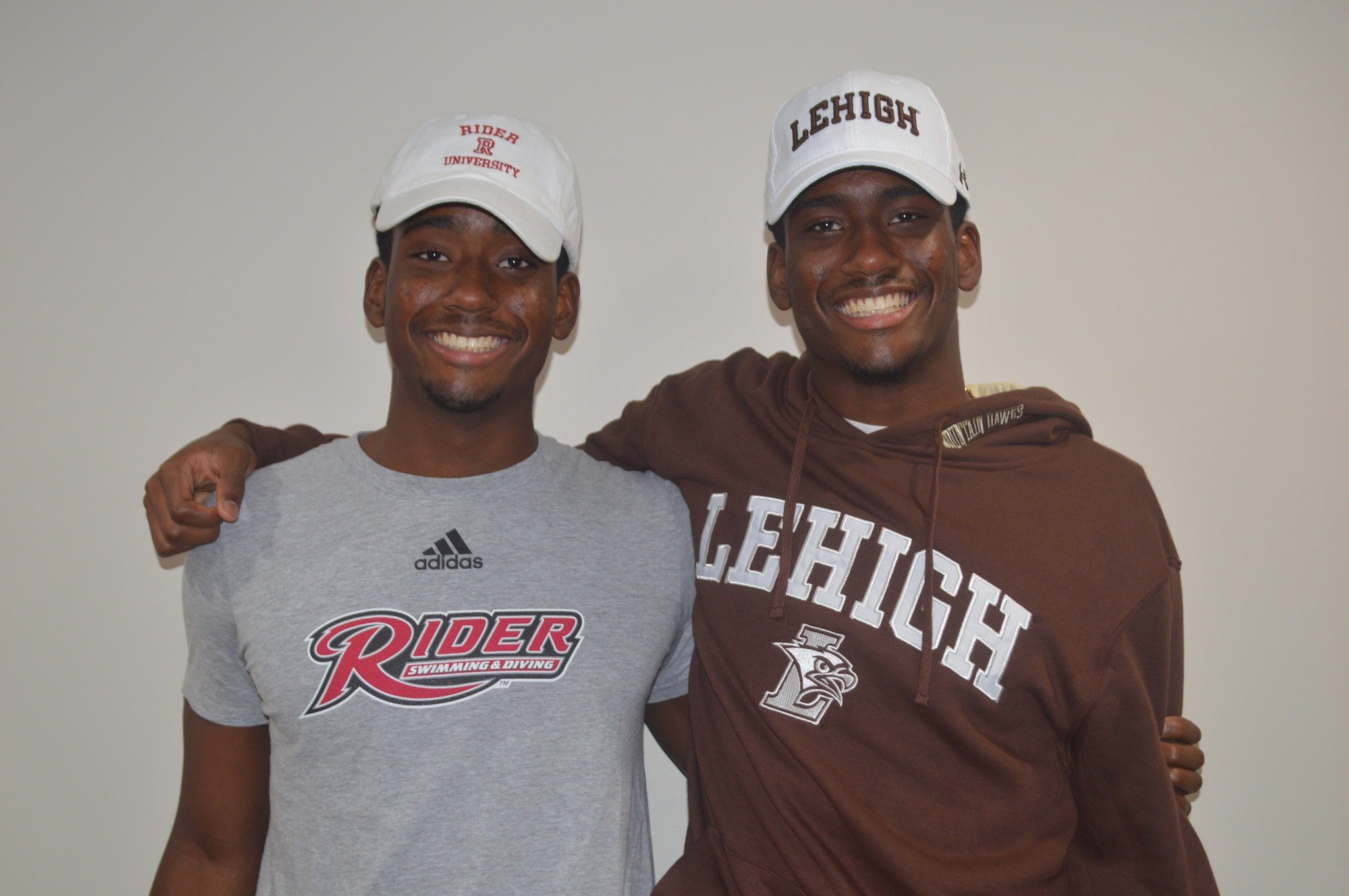
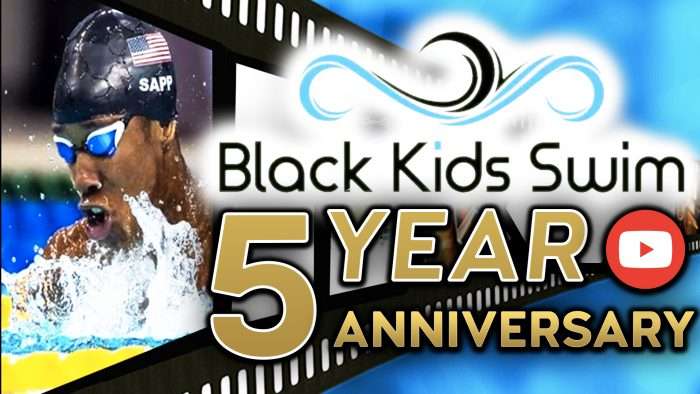
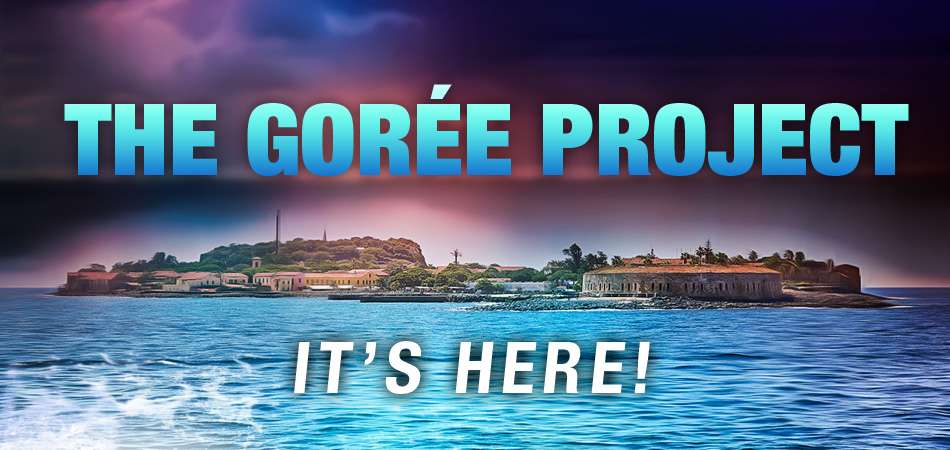
Bert Pychardo
May 19, 2017 11:26 amThank you for this post ! 😀